Dramaroom, Part One
How the theater became a home for me. Columbia, South Carolina, 1989-1994.
If you’d rather listen to this essay in a browser or as a podcast, click the audio voiceover (“listen to post”) above. Read this if you need instructions on how to listen to episodes on your podcast app.
If you’re reading this in your inbox, you can find a shareable, web-friendly version at ashleighellskells.substack.com, where all my other essays and podcasts live. You can request to follow me on Facebook here and Instagram here, and I’m happy to hear from you at aellsworthkeller@gmail.com.
Subscribers: If your inbox clips the message, you can simply click on the web address above and read it that way. This is Part One. Next month’s newsletter will be Part Two.
This two-part essay series is dedicated to all the incredible Drama teachers and directors who have mentored me over the years, especially Donna McKenna-Crook, who will always hold an enormous spot in my heart for all the love and dedication to both the craft and to her students. She trusted us and gave us so many opportunities to stretch our dramatic muscles in all kinds of ways; the time and energy she poured into A.C. Flora High School’s Drama program made it one of the best in the state. I owe so much of my knowledge (and more!) to her.
(Oh, and I use “theater” and “theatre” interchangeably).
OFFSTAGE
The action begins in the dark. Everything is set; props are in their proper places, actors are in costume, holding their breath, techs are whispering into their headsets. The murmurs of the audience dim into a hush. I am in the wings, ready to move towards the light, my heart a little bit jumpy, but the lines in my head as smooth as water.
Age 25, Theatrikos, Flagstaff, Arizona: My face close to my costar’s as I squint at him in the dark, meticulously drawing a bruise on his mouth. His character had been beaten up by my character’s boyfriend, who we come to find out is ragingly homophobic. I’m caught in the middle, carrying my own baggage, but for now, I’m just an actor painting another actor’s face.
Age 18, Church Hill Theatre, Edinburgh, Scotland: The sweet smell of cigarettes wafting in from passersby on the cobblestone street, making its way through the back doors and into the bowels of a church-turned-theater, a holy place transformed into a new holy place.
Age 15, A.C. Flora High School Little Theatre, Columbia, South Carolina: From the wings, light in front of me and darkness behind me, I didn’t see the sarcophagus opening, but I felt my fellow actor place his hands on my shoulders and gently pull me out of the way, my body frozen like a corpse, shocked by his momentary touch.
Age 12, Crayton Middle School theater, Columbia: Pulling on an itchy old hag wig that smells like body odor and the Chanel No. 5 that I had doused it with, my mom’s cologne an attempt to make it better, but the powerful cologne only exacerbated the powerful smell.
(All the strongest witches smell like body odor and Chanel Number 5).
Age 10, Keenan High School theater, Columbia: My second play. I’m a cavewoman in a prehistoric beauty pageant waiting for my grand entrance, and the B-52’s “Bushfire” is screaming over the speakers as one of my costars, another 5th grader, trots around onstage; a lip-syncing, prepubescent Mick Jagger.
The theater is a portal to a new world, a bright thread leading to every other theater there ever was and ever will be. It’s a black hole pulsing with energy, propelling you from one place to the next, one time period to the next, transcending space and time. (This sounds metaphorical, and yet it is not metaphorical). Your every moment on stage is being filed away, stacked and multiplied into a collection of experiences carried with you, on and on, into oblivion, or eternity; its own hall of mirrors, because we actors like being looked at.
In this otherworldly realm, you can slip on a new face. You can become a different person. You can be old and you can be young. You can be everything, all at the same time. In one play, I was an old lady in one scene, and in the next I was a child. Different hair, different dress, different posture. And then the costumes slid off and I was 15 again.
Backstage is the prelude, the calm before the storm. Time to pull back the curtain.
Act One: EARLY YEARS
Scene One: Elementary School
Lights low, entering from stage left a young girl, barely double digits. She walks out cautiously, barefoot and full of wonder, like she’s dipping her toes into the Atlantic for the first time.
Early in my 5th grade year, I came home from school one afternoon and announced to my mom, “Eden is signing up to do Drama and I want to, too.” Eden, one of my best friends, was artistic, confident, and easily the smartest kid in our class. She was also supportive of all her friends with a wisdom beyond her years.
My mom was tickled pink. She told me after that day that she’d been waiting years for this: her quiet daughter finally wanted to get up on stage and become the fully-formed, outgoing girl that she herself had become.
The names of the women who directed theater in Columbia, South Carolina are huge and well-known: Mary Lou Kramer, Bette Herring, Donna McKenna. These women were and are, undoubtedly, larger than life, didn’t suffer fools, and inspired thousands of young people to pursue the arts.
Mary Lou Kramer, former director of the Columbia Children’s Theatre, is the first person I heard described as “Columbia Theater Royalty.” When my mom was a child, Mrs. Kramer had been her next door neighbor; not only did my mom start taking acting classes, she benefited from one-on-one instruction simply because of her proximity. It was through Mrs. Kramer’s mentorship that my mom was able to overcome her severe, almost debilitating shyness and find her bubbly, outgoing personality. While the arc of my own parabola wouldn't be as steep, she clearly hoped that the same thing would happen for me.
So, along with several of my classmates—Hardy, Emily, Andy, Eden, Lucas, Tirza, Yamaneika, and Tirza’s sister Sharon—I started taking Drama classes once a week after school through the district’s enrichment program. We went through basic acting techniques, staging, projecting our voices, playing games, and, finally, auditioning for our first play, a version of “Cinderella.”
I won the lead.
Once I was onstage, I was having way too much fun to be anxious about it. Your character is a buffer between your true self and the audience; it’s far less intimidating to get up in front of people and be someone other than yourself. I knew the character of Cinderella, and I knew what I needed to do to be her. So I did it.
After our show, Eden (who, unlike me, had no problem holding court with adults) told my mom that being in the play “really brought Ashleigh out of her shell!” Just like my mom had hoped, acting opened the door for the me bubbling up inside.
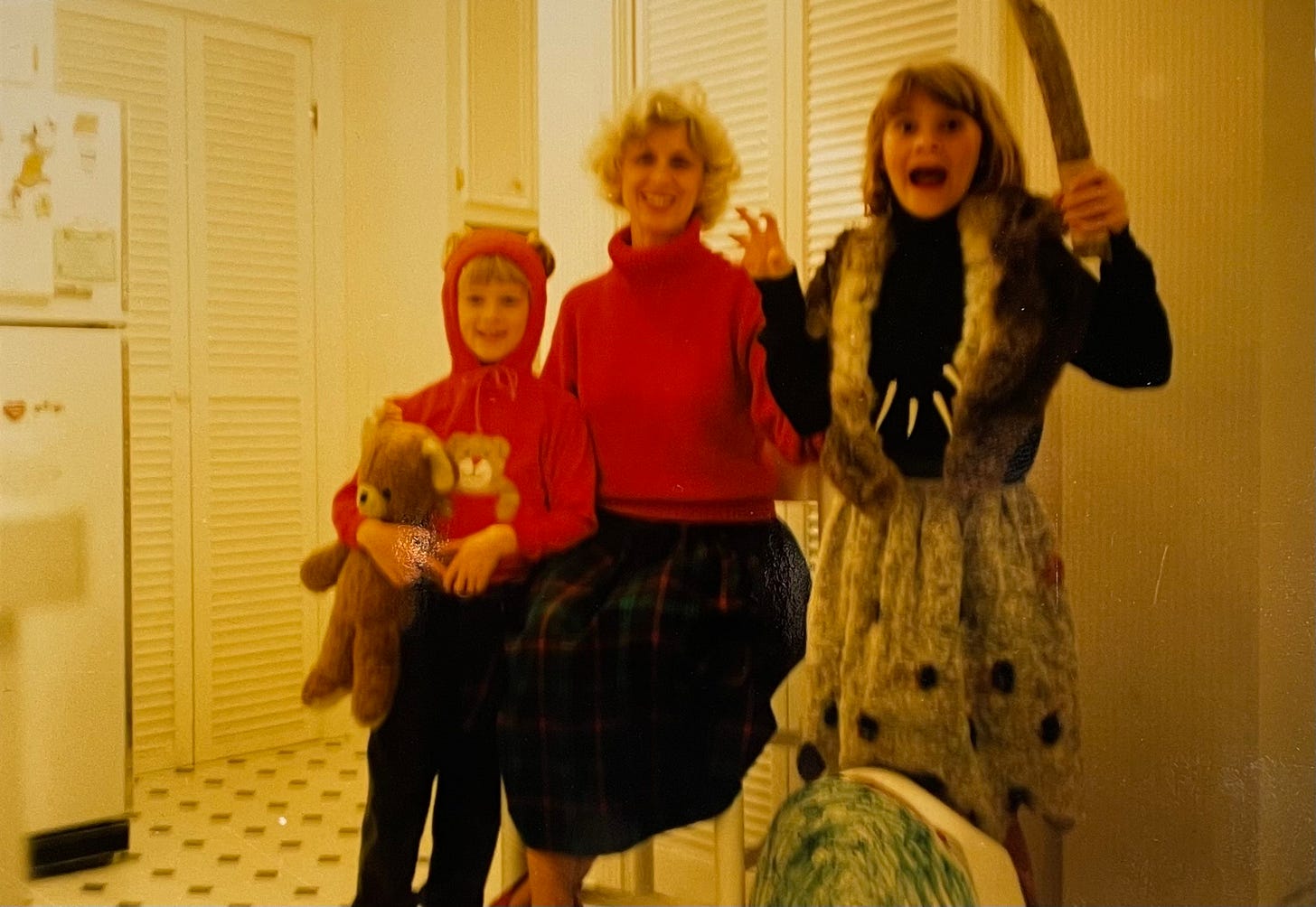
Act One, Scene Two: Middle School
A girl, a little older now, skips out onstage. She looks around and grins widely. Papers fly out from stage left and stage right and surround her. She does a little twirl and tries to catch them. So many stories, so many possibilities.
I was hooked. The drama pipeline from elementary to middle to high school is something that now I recognize was a huge privilege; a school district that, at least at the time, valued the arts, offered in-school dramatic instruction, employed high-quality teachers, and gave kids from all backgrounds free access to new, life-changing skills.
We were lucky—my middle school drama teacher was another of Mary Lou Kramer’s proteges, Bette Herring. Mrs. Herring had taken up the torch of leading children’s theater in Columbia and had started her own company, Upstage Theatre, as well as teaching Drama to 6th, 7th, and 8th graders at Crayton Middle School. She was ruthless and exacting and wasn't exactly mean but I doubt anyone would describe her as warm or maternal. Like my mom, she, too, had learned from the best.
And now that I think of it, actually, my mom was probably my first Drama teacher. It was the way she animatedly lived her life that taught me how to put on a face to the public that wasn’t always the person you were inside. While that sounds like a bad thing, she showed me how to make it into a good thing. (She also showed me how carrying over the melodrama from the stage to the home front can have dire repercussions for the development of a daughter who doesn’t look like you. But that’s for another time).
It was my mother’s illumination of the Weird Sisters from “Macbeth”, lines she would recite to me and my brother, that revealed how one could be a beauty queen in one life and still wholeheartedly—and convincingly—embody a dark world of crones, malice, and death:
For a charm of powerful trouble, Like a hell-broth boil and bubble Double, double toil and trouble; Fire burn and cauldron bubble!
Years later, this singular recitation inspired my audition and casting, against type, as “The Witch” in our seventh grade play.
Each of the six drama classes—two per grade—wrote our own short play and performed it for the whole school. Us 12-year-olds whispered to one another that Mrs. Herring came up with the idea so she could make the kids do all the work and she could sit back and relax (I’m still not convinced we were wrong)! Whatever the motivating factors, though, it was still a fun project.
The only requirement, perplexingly, was that the story had to center around an egg. While it was a collaborative effort, the bulk of the story was taken from my submission, a lightbulb of an idea about a town full of people trapped inside an egg by a spell cast by an angry witch. The townspeople wore green, decked out in costumes borrowed from Oz. There was a mayor, played by a kid named Andy, who’d played Prince Charming in my first play, and I’m pretty sure he wore a big top hat, like mayors always do. There was a wise-cracking kid, played by a kid named Winston, who got a lot of laughs. There was a Blue Chicken, my friend Rachel’s idea, and it was all very silly and strange and almost exactly how I imagined it in my head, when finally the townspeople are rescued (after 99 years—just in time!) and the witch herself is banished into the egg for eternity.
It turns out that I still have the four-page script from our play, but even without it, I can recite, from memory, the lines I wrote and spoke in my wacky witchy voice, as weirdly as a Weird Sister herself:
For a hundred years You will rest In this egg (it is the best)! If a hundred years pass And no one finds you You will vanish, and leave no trace behind you Muahhhaaa!!!
As a precocious seventh-grader I inhabited that character completely, a childlike version of three Sisters in one. I came out on stage and blew that performance right out of the water, costumed and made up and donning a long gray, wiry wig. In the faulty reasoning originating from a 12-year-old’s brain, I’d sprayed my mom’s perfume on it to try to mask the stink. (Catching a whiff of Chanel No. 5 nowadays takes me right back to 1992 and all sorts of buried feelings, as you can probably imagine).
Afterwards, from my classmates and teachers I got a lot of “Which character did you play?” and “I didn’t see you on stage.” I’d fooled everyone into thinking that The Witch was her own person, and not a character played by a kid in the seventh grade play.
I was a good witch. Not a “Good Witch”, but I was good, I mean really good, at being a witch.
Act One, Scene Three: The Big Apple
Sparkly neon lights shine overhead. Row upon row of middle schoolers sit on a slowly moving bus, gazing at the glitter going by, their mouths open in wonder, possibilities for their own futures swimming in their heads.
Through Mrs. Herring’s annual Spring Break trips, a few dozen of us theatre kids and chaperones rode on a chartered bus the 700+ miles from South Carolina all the way to the City of Dreams: New York. My parents were generous enough to let me go twice, in eighth and ninth grades, and my brother and dad joined me on the second visit.
New York in the early nineties was everything I thought it would be. Lights and noise at every hour of the day and night, possibility swirling with a kind of scrappiness I couldn’t fully grasp, a feast for the eyes around every corner; ugly or not, it was new to me, and it was beautiful. Every morning, we ate real NY bagels topped with a pound of cream cheese from the diner next door. We shopped till we dropped at the South Street Seaport, Chinatown, and FAO Schwartz, where I bought a little stuffed dog I named Golden Delicious, which I still have to this day. We had dinner at Planet Hollywood, where I was surprised not to see any celebrities. We visited the Museum of Natural History, toured NBC Studios, and drove beneath the Twin Towers, which we didn’t get to visit because they had just been bombed (this was April 1993).
The climax of the trips, the whole reason for going, were the three Broadway shows we got to see. One year was the classics: the powerhouse triumvirate of “Cats”, “Les Miserables”, and “Phantom”. And every other year were the new shows. On our 1994 trip, we saw an underwhelming (and irritating) “My Fair Lady,” and a completely forgettable “Joseph and the Amazing Technicolor Dreamcoat.”
But those two duds didn’t matter at all; the third show made up for it in spades. It slapped me in the face, dragged me over a mountain of gravel, chipped my tooth, and propped me up, teetering, stars circling my head, wanting more.
Enter: “The Who’s ‘Tommy’”.
I’m not overreaching when I say that it was a truly life-altering performance, the kind of thing you remember as the Before and the After. From the opening montage, Tommy swept us into his world, first as a child who witnesses a horrific crime, to an adolescent with PTSD from that event, to a young man who is discovered to be an absolute wizard on the Pinball machine.
And then to a fully formed adult, a sudden celebrity by way of being both a champion Pinball player and (somewhat inexplicably) a Rock Star, bursting out from the cloud of trauma of his childhood (the Pinball healed him!). I was old enough to grasp the metaphors of the Christlike figure, the martyrdom and sacrifice, the downside to all this reluctant power.
And while I was only vaguely aware of The Who before all this, to my young ears, this music was freaking mind-blowing.
During the show, I fell in love with all the actors while simultaneously wanting to be all of them. I must have clapped my hands red with the force I gave to my standing ovation, bursting with appreciation and wonder, and our whole group was on their feet, all the way up in the balcony. Down in the lobby, I was buzzing, all of us kids were buzzing, and we even got to meet one of the actors who played “Young Tommy, age 11.” (It was a girl! She’d had to cut her hair for the part!). We were awestruck.
I used most of my spending money to buy a Tommy keychain, a Tommy t-shirt, an overpriced Tommy sweatshirt, and a cassette of the Original Cast Recording (which spent hours looping through the headphones on my Walkman on the long bus trip back to South Carolina).
After witnessing a performance that literally rocked my world, I made a promise to my 14-year-old self that if I ever got the chance, I would audition for the role of Mrs. Walker, Tommy’s mother. After all, I was about to spend years singing along to the soundtrack, practicing her part.
(And I did have one chance, 22 years later, to audition for a local production of “Tommy”. I was nine months pregnant. What would you have done?)
With stints over the next year as a “Lady of Oz” in Upstage’s “The Wizard of Oz”, “Mrs. Claus” in a small production at a mother-daughter luncheon at my church (my grandmother played the piano, and my mom played Mary, the teenage mother of Jesus), and as a “Dead Cheerleader" in a haunted house in an abandoned mall, I kept my craft up, as they say.
But I was about to be thrust into the next phase of my young theater career: the A.C. Flora High School Drama Department.
Act Two: A.C. Flora High School
Scene One: Dramaroom
A classroom, formerly antiseptic, filled with shape and color, students coming and going, a torrent of sound and light and energy, everyone and everything alive. They don’t even know how lucky they are.
The Dramaroom (in my brain, always one word) was tucked away in a corner of the sprawling sixties-style ACF campus, windows facing the playing fields nestled down below, snuggled up next to the Little Theatre.
Outside of the heavy metal Dramaroom doors, all the little cliques—the preps, the skaters, the hippies, the nerds—were far too defined for my liking. But the Dramaroom was a place where those categories mostly dissolved, a little enclave where everyone was welcome (it was a safe place to hang out when you needed to cut another class!), and everyone was (mostly) equal.
The captain of our proverbial ship was Donna McKenna-Crook, known to us as Mrs. McKenna, who won the well-deserved honor of Teacher of the Year my junior year. She was committed to her students and to giving us a well-rounded theater experience, laying all the groundwork for whatever future endeavors we might pursue, drama-related or not. She was warm and a little eccentric (in a Ms. Frizzle sort of way), with high expectations for her students, as any great teacher should have. She had (and still has) one of the biggest hearts I’ve ever known.
I opted to get some of the requisite electives like PE out of the way freshman year, so I started taking Drama classes as a sophomore. We covered European theatre history from its Greco-Roman origins, the development of Commedia dell’arte in Italy, and Elizabethan theatre. There was Shakespeare, of course, but also his contemporaries Christopher Marlowe and Ben Jonson.
We examined Moliere and Voltaire and discussed the once-controversial reception of plays and playwrights, this public scrutiny only having been muted within the last hundred years. We studied the history of once-popular theater formats like minstrel shows and burlesque. We covered American theater figures like Eugene O’Neill, Rodgers and Hammerstein, Mae West, Edward Albee, Thornton Wilder, and many, many more.
One of my favorite projects that first year was when we practiced “producing” our own play. We each chose a real play to score, and I got to rip out the pages of a book—for a school project!—and mark them all up with notes and stage directions, just like a real director would do.
The play I chose was “Lady Windermere’s Fan,” an 1892 tragicomedy by the brilliant and beautiful Oscar Wilde. It involves a case of mistaken identity (and mistaken infidelity) amongst some Victorian high-society characters intermingled with those from a lower social class. The “fan” in the title is used as both a literal and figurative element; one character “accidentally” mistakes another character’s fan as her own, and all of the confusion plays out in a clever (yet heavy-handed; Oscar Wilde really likes to hammer his points home) way.
The culmination of the project was designing my own playbill, and getting to fantasy-cast whoever I wanted in the roles. I chose a lot of the hot celebrities of the mid-nineties; Winona Ryder as Lady Windermere herself, with support from most of the cast of “Legends of the Fall” and of course Claire Danes, and I gave Weezer’s entire lineup some of the smaller roles.

Along with my love for hot celebrities and Weezer, I got really into Oscar Wilde, studying him closely even outside of class, and his plays, poems, and writings were highly inspirational for a teenage girl living a hundred years after he died. My journals are peppered with quotes from his works, and one hideous-yet-intriguing monument dedicated to him includes this dashing line from “Lady Windermere’s Fan,” uttered by Lord Darlington (played by Aiden Quinn in my production):
We are all in the gutter, but some of us are looking at the stars.
(Romantic sigh).
The classes also covered the components of stage design and management, all the backstage stuff that gets taken for granted, like lighting, costuming, and props.
We wrote our own skits, performed short plays, memorized monologues, and dabbled in stage combat. We got to choreograph and showcase our own mime performance (sans makeup), and I had so much fun utilizing the cool* techniques of “pulling on a rope” and “walking down the stairs” and even “stepping in dog poop,” all to the tune of “The Syncopated Clock.” (Miming doesn’t get enough cred!)
We spent a good month learning all about Method acting and then performing with those techniques in mind. There were so many components of acting that I had never known existed before, and Mrs. McKenna introduced us to a number of them. Everyone in the class got better and better, thanks to her.
(*cool is subjective)
Act Two, Scene Two: “The Man Who Came to Dinner”
From stage right, a teenage girl walks in confidently. Her feet gravitate effortlessly to the tape on the floor. She stops and looks out over the heads of the audience, seeing them but seeing beyond them, too. She opens her mouth to speak.
Twice a year, the Drama department at A.C. Flora would put on a play (no musicals; musicals were beneath us**), and fall of my sophomore year it was “The Man Who Came to Dinner.” I auditioned and got a small part. I had wanted a bigger role, but quickly learned that those were reserved for the seniors who had actually earned it (and were better, anyway).
So I started at the bottom: “Mrs. Dexter” (a busybody older lady with just a few lines) and the nameless “Pitch-Piper in the choir” (alongside Ali, another young-looking classmate and a couple of actual children). I was also on the prop crew and, perhaps most importantly, held the title of “Food prop manager”, where it was my job to make sure the food was set up appropriately and fresh corn flakes were poured for every show.
This play was a goofy, over-the-top shenanigan-filled romp written by Moss Hart and George S. Kaufman, set around the time it was written, 1939. (It was made into a movie starring Bette Davis, too). The plot revolves around an uppity radio critic who must convalesce at the home of an Ohio family over the holidays, and whaddya know, absurdity ensues!
During the time we were rehearsing for the play and then through the performances, “The Man Who” was my life. All the silly backstage antics, all the rehearsals and costume fittings and line runs, all the gears turning, making me into the most authentic version of myself I could muster, at least for being fifteen.
December 2, 1994 Dear Journal, The drama department has done WONDERS for me. I’ve learned A LOT about acting, made new friends, and made myself a better person.
The people surrounding me in the theater were the people I wanted around me outside of the theater, too. I was always observing and analyzing, paying close attention to everyone onstage and behind the scenes, and writing all about it, too:
Myra (“Maggie Cutler”): I love her. She is really talented. She is also very nice and we talk in Mrs. Seavey’s class.
Brianna (“Miss Preen”): Okay, so she might not be the most normal person on the planet, but she can be nice sometimes, like today when she squeezed my hand as a way of saying ‘Good luck!’
Michelle (Crew): She is so wacky! But she’s also really nice and fun. She’s a freak—that’s the only word for it—but freaks are good.
Jesse (“Banjo”): He is so sweet and friendly. He is also one of the funniest people I know. But tonight he was really pissed; I felt so bad for him. He does A LOT and never gets enough credit for it.
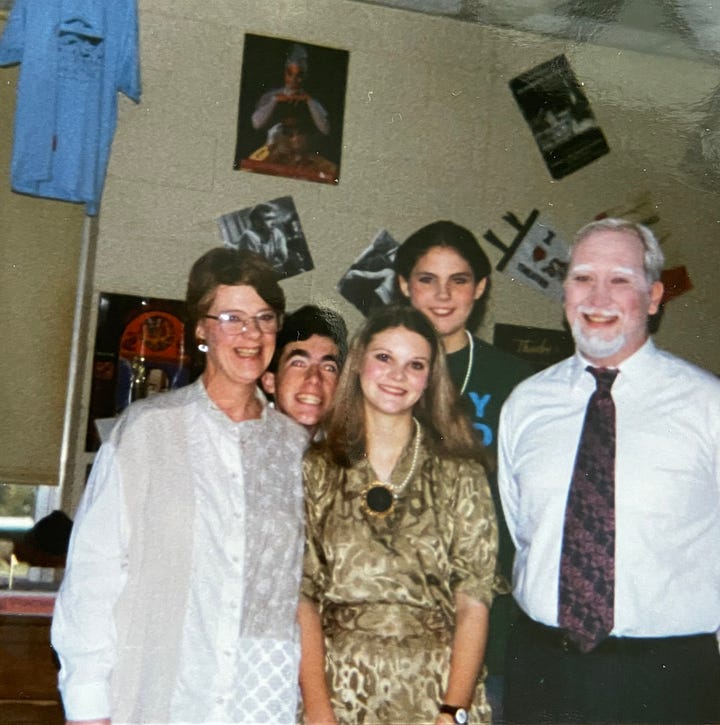
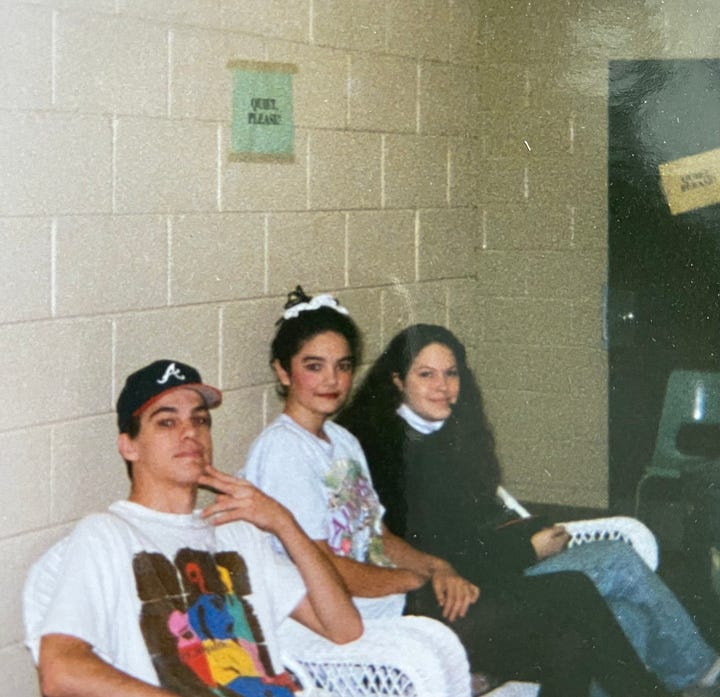
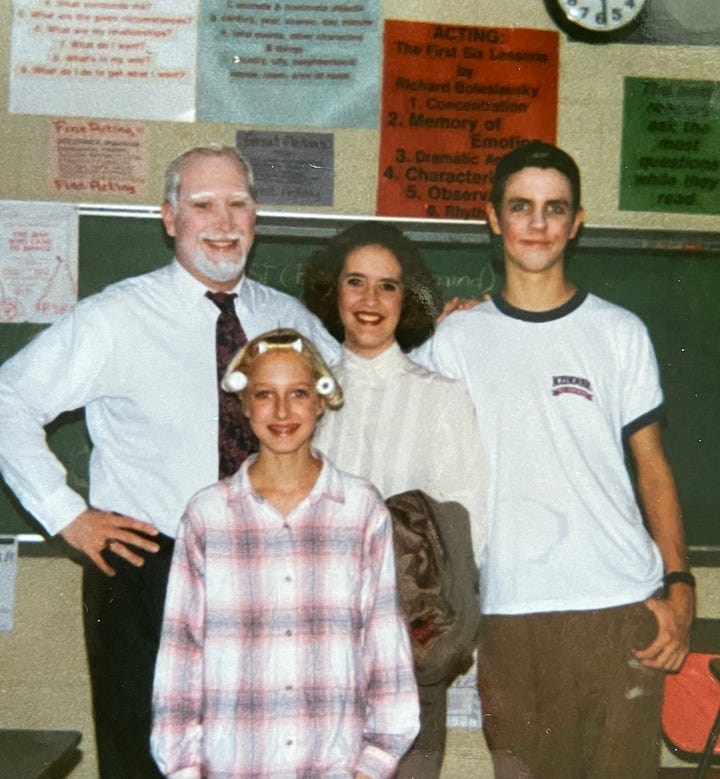

I got close with plenty of upperclassmen and met so many real people who were fun and funny and disliked the social strata at ACF as much as I did. Some of them cared a lot about acting and some of them just wanted to do something fun, but everyone was quirky, and for a brief moment, we were all equal.
Mrs. McKenna designed all of the incredible sets and her husband would build them. Students would come in on a tech weekend to help out, and these sets transformed our black box into a living room or a forest or a garden. Once built, I felt almost a reverence for the space we occupied, fleeting and momentary and momentous. The show would run for a couple of weekends, the set being up for several weeks, and I would go visit it sometimes after class.
Standing in the dark in the quiet theater, knowing that it would all disappear but not wanting it to; it was painful to imagine the physical space without our energy in it. I missed it even before it was gone.
On closing night, we would stay late for strike, where we’d tear down the set and return the theatre to its blank slate state. The magic had always been temporary; those moments turning into memories instead of the daily practice of our brains and the rhythm of our bodies. All this time we’d shared, scripted and unscripted, could never be replicated.
After every show I’ve been in, I’ve felt a deep ache of loss once the lights go dark. That this body we’d built, the life we’d breathed into it, was dead.
I always wondered if anyone else felt that way, too, wishing it could never really end.
Things were always more fun with boys around; there were a handful of guys involved in the play, and though practically all of them had girlfriends, getting to know them had been really fun. No matter their sexual orientation, Drama guys weren’t afraid to reveal their vulnerable side; showing affection, hugging each other, even breaking out in spontaneous dancing. I felt like a witness to a world that didn’t exist at my high school outside of the Dramaroom.
They were all juniors and seniors, and two in particular (“Ernest Stanley” and “Sandy”) became secret crushes for the rest of that year. One day in December, we had a sub in French, so I skipped class and hung out in the Dramaroom. I was setting out the letters for the school marquee, and Ernest (he was also skipping class) helped me get them all lined up. He described himself as an asshole, but it was all an act. He was always super kind to me, and on this day he smelled like chocolate chip cookies.
Sandy was the even bigger crush. My nerves would explode when we’d pass each other in the hallway, and although I couldn't make my mouth speak, it didn’t stop me from always waving and smiling goofily at him.
There had been plenty of unspoken eye contact backstage, and one time, in the darkness, he’d put his hands on my shoulders and gently pulled me out of the way of the prop sarcophagus that was about to get rolled onto the stage. I haven’t forgotten that. (Clearly).
For the rest of that year, whenever we’d see each other around, he wouldn’t say much, just give me that huge beautiful smile of his, and lightly touch the small of my back as a way of saying hi.
It melted me.
They were both really different from anyone I’d ever liked before; they were subversive but kind, rebellious but with soft hearts. Nothing real ever came from these crushes—they both had girlfriends, like I said, and other things going on—and yet that isn’t quite true.
The most real thing of all is that my obsessive teenage attraction to them made me realize that I was changing. I still liked some classically sporty dudes and the like, but give me a seventeen-year-old with a Sonic Youth t-shirt, Converse One-Stars, and a protective scowl on his face, and I’ll fall in love.
There would be no going back to the old me.
I traded Friday nights at the movie theater for late-night diners and coffee shops near the university. The downtown IHOP was a popular spot for underage high schoolers from across the city who wanted a stack of pancakes with not only an array of sweet, sticky syrups, but the pervasive cloud of cigarette smoke wafting in through the front door from all the kids standing outside in the cold parking lot getting their smoke on.
Teenagers in the nineties smoked a lot, and theater kids made the worst (best?) smokers: we couldn’t drink, we were constantly wanting attention, and all that intensity needed an outlet. So we smoked.
I wasn’t some big smoker in high school; I probably smoked less than a full pack the entire four years. But I was constantly surrounded by people who did, and I decided I needed some of my own. I’d gotten the tip that the smoke shop in Five Points didn’t care that you were under 18, so one night, a plan was put into action. The only cash I had was a $10 bill that I’d accidentally cut in half and taped back together, so I wasn’t nervous at all when I bought my first pack, a rust-colored box of Djarum cloves.
I gave most of my cloves away, returning favors to my friends, but the ones I kept I stashed in my cassette case of “(What’s the Story) Morning Glory?”
(As Rob Harvilla writes in his brilliantly hilarious book, 60 Songs that Explain the ‘90s, “What’s the single most ‘90s sentence I could write?” That’s another one for ya, Robby)!
It was the perfect size to keep a half-dozen cigarettes, and Oasis was permanently fixed in my tape player at the time. I haven’t smoked cloves in years—they’ve been banned in the U.S. since 2009 because teenagers liked them too much—but I have that cassette still, and that unmistakable, intoxicating scent of cloves still lingers.
We found ways to entertain ourselves, hanging out in city parks after dark, a bunch of not-kids, playing on the playground, making jokes about the graffiti and the kinds of people who would visit these same parks later in the night, long after we’d gone to bed.
It wasn’t exactly naughty or rebellious, but it wasn’t exactly good, clean fun either. It was just right.

(**A note about musicals: For whatever reason, almost all of my Drama teachers did plays, not musicals. Musicals for the K-12 set were fun, but…a little bit pandering? Over the top? As for me and my cronies, we were serious actors, and busting into song mid-scene is definitely not serious.
Because of all this, I still have a love/hate relationship with musicals, though it’s mostly all love now. Hit it out of the park!)
Part Two is available here!
Reflection questions:
Did you have a talent or an extracurricular activity that defined your young years? What was it, and in what way are you employing it today?
What is the name of a teacher who had a big impact on you? Have you ever told them?
Think about a time when you took a risk and you were changed for the better because of it.
Columbia is in present day Richland County, South Carolina, on the land of the Tsalaguwetiyi (Cherokee, East) and Congaree nations.
Image: Me as Isabella, in some theatre, somewhere in the world, 1997.



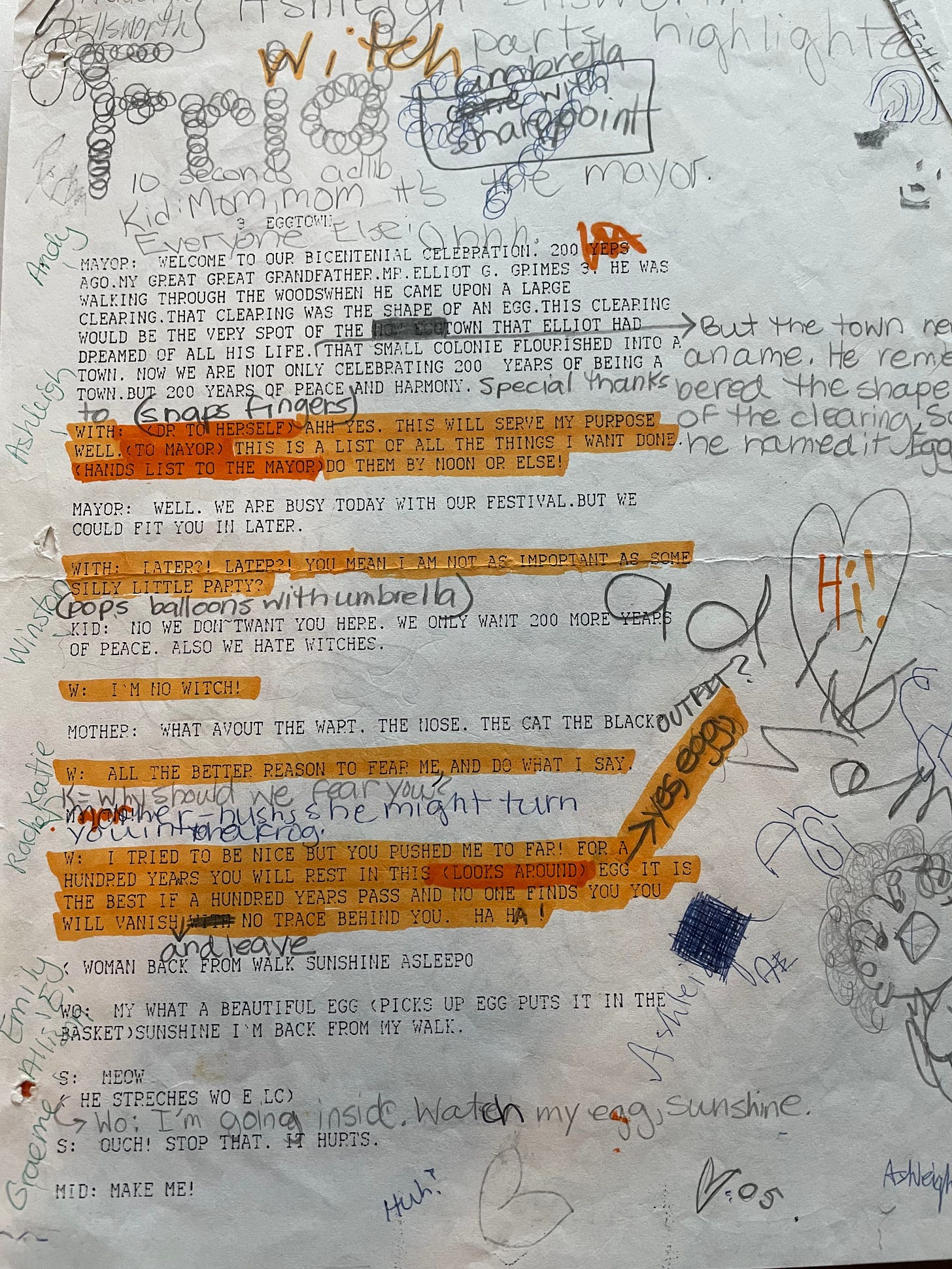
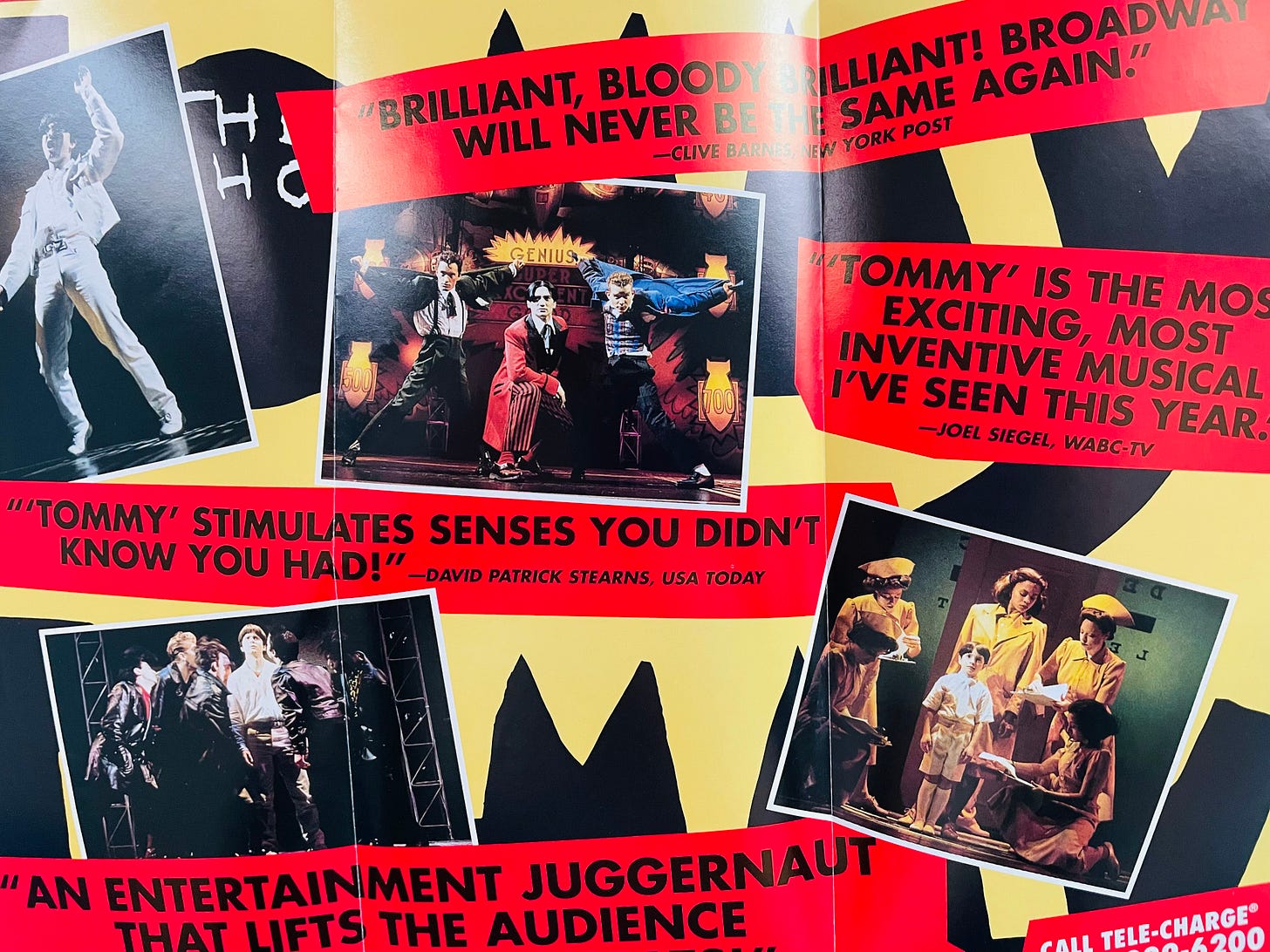
I just heard Weezer on the radio and immediately googled your name and I'm SO VERY GLAD that I did. Hiiiiiiiiii! *waves excitedly from Colorado*
This was an amazing read, Ashleigh, and now I'm homesick for High School and subscribing to your substack.
<3 Graeme